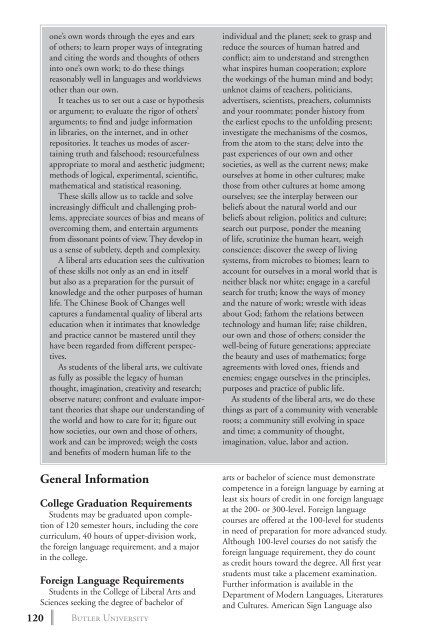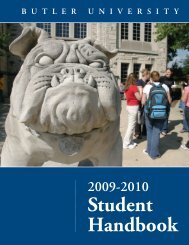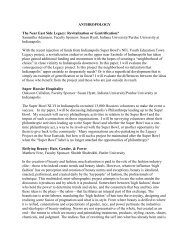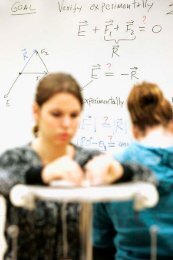2 0 1 3 bulletin - Butler University
2 0 1 3 bulletin - Butler University
2 0 1 3 bulletin - Butler University
Create successful ePaper yourself
Turn your PDF publications into a flip-book with our unique Google optimized e-Paper software.
120<br />
one’s own words through the eyes and ears<br />
of others; to learn proper ways of integrating<br />
and citing the words and thoughts of others<br />
into one’s own work; to do these things<br />
reasonably well in languages and worldviews<br />
other than our own.<br />
It teaches us to set out a case or hypothesis<br />
or argument; to evaluate the rigor of others’<br />
arguments; to find and judge information<br />
in libraries, on the internet, and in other<br />
repositories. It teaches us modes of ascertaining<br />
truth and falsehood; resourcefulness<br />
appropriate to moral and aesthetic judgment;<br />
methods of logical, experimental, scientific,<br />
mathematical and statistical reasoning.<br />
These skills allow us to tackle and solve<br />
increasingly difficult and challenging problems,<br />
appreciate sources of bias and means of<br />
overcoming them, and entertain arguments<br />
from dissonant points of view. They develop in<br />
us a sense of subtlety, depth and complexity.<br />
A liberal arts education sees the cultivation<br />
of these skills not only as an end in itself<br />
but also as a preparation for the pursuit of<br />
knowledge and the other purposes of human<br />
life. The Chinese Book of Changes well<br />
captures a fundamental quality of liberal arts<br />
education when it intimates that knowledge<br />
and practice cannot be mastered until they<br />
have been regarded from different perspectives.<br />
As students of the liberal arts, we cultivate<br />
as fully as possible the legacy of human<br />
thought, imagination, creativity and research;<br />
observe nature; confront and evaluate important<br />
theories that shape our understanding of<br />
the world and how to care for it; figure out<br />
how societies, our own and those of others,<br />
work and can be improved; weigh the costs<br />
and benefits of modern human life to the<br />
General Information<br />
College Graduation Requirements<br />
Students may be graduated upon completion<br />
of 120 semester hours, including the core<br />
curriculum, 40 hours of upper-division work,<br />
the foreign language requirement, and a major<br />
in the college.<br />
Foreign Language Requirements<br />
Students in the College of Liberal Arts and<br />
Sciences seeking the degree of bachelor of<br />
<strong>Butler</strong> <strong>University</strong><br />
individual and the planet; seek to grasp and<br />
reduce the sources of human hatred and<br />
conflict; aim to understand and strengthen<br />
what inspires human cooperation; explore<br />
the workings of the human mind and body;<br />
unknot claims of teachers, politicians,<br />
advertisers, scientists, preachers, columnists<br />
and your roommate; ponder history from<br />
the earliest epochs to the unfolding present;<br />
investigate the mechanisms of the cosmos,<br />
from the atom to the stars; delve into the<br />
past experiences of our own and other<br />
societies, as well as the current news; make<br />
ourselves at home in other cultures; make<br />
those from other cultures at home among<br />
ourselves; see the interplay between our<br />
beliefs about the natural world and our<br />
beliefs about religion, politics and culture;<br />
search out purpose, ponder the meaning<br />
of life, scrutinize the human heart, weigh<br />
conscience; discover the sweep of living<br />
systems, from microbes to biomes; learn to<br />
account for ourselves in a moral world that is<br />
neither black nor white; engage in a careful<br />
search for truth; know the ways of money<br />
and the nature of work; wrestle with ideas<br />
about God; fathom the relations between<br />
technology and human life; raise children,<br />
our own and those of others; consider the<br />
well-being of future generations; appreciate<br />
the beauty and uses of mathematics; forge<br />
agreements with loved ones, friends and<br />
enemies; engage ourselves in the principles,<br />
purposes and practice of public life.<br />
As students of the liberal arts, we do these<br />
things as part of a community with venerable<br />
roots; a community still evolving in space<br />
and time; a community of thought,<br />
imagination, value, labor and action.<br />
arts or bachelor of science must demonstrate<br />
competence in a foreign language by earning at<br />
least six hours of credit in one foreign language<br />
at the 200- or 300-level. Foreign language<br />
courses are offered at the 100-level for students<br />
in need of preparation for more advanced study.<br />
Although 100-level courses do not satisfy the<br />
foreign language requirement, they do count<br />
as credit hours toward the degree. All first year<br />
students must take a placement examination.<br />
Further information is available in the<br />
Department of Modern Languages, Literatures<br />
and Cultures. American Sign Language also
















